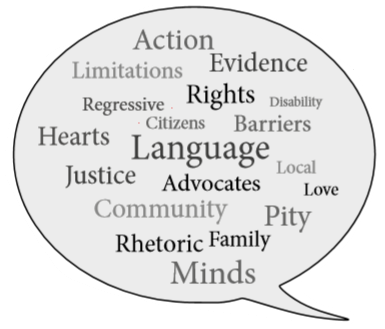We are all able to act against injustice, but the way we discuss human rights needs re-examining if we are to truly advocate and build communities, says Simon Duffy
After several decades of progress towards inclusion and human rights for disabled people, we are now in the midst of a difficult period.
The last 10 years in the UK have seen regressive government policies and, unless something changes radically, we can expect this to continue for at least another 10 years. These injustices are not happening on their own – they are combined with general attacks on people in poverty and a failure to address the growing environmental crisis seriously. We are not robots and, for good or ill, we can do self-destructive things, whatever the rational evidence. We are also capable of waking up, changing our minds and getting active. We are all citizens in waiting. So now is a good time to take a fresh look at the language and rhetoric we have used to defend and advance the interests of disabled people – especially those with learning difficulties.
Dark side of pity
We know that the old style of advocacy was the advocacy of pity and this does get a reaction. However, pity is not only patronising but also easily exhausted and, as the well of pity runs dry, humans often turn to darker thoughts. It is only a short step between seeing someone as pitiful and seeing them as dangerous and in need of removal. More recently, disability advocacy has operated in a more egalitarian spirit and has achieved a great deal. Deinstitutionalisation, independent living and disability rights are widely accepted as hallmarks of a civilised society.
Today, in the UK at least, the government has learned how to blunt the impact of these demands and, so far, we have not been able to ignite the interest of the wider public in the multiple injustices experienced by disabled people. I want to propose that this is partly because the language of human rights, while important and truthful, on its own is inadequate. Note the caveats. I am not proposing that we abandon our commitment to rights. I think we will need to supplement it with other ideas – and other ideals.
The language of rights has always suffered from limitations. For instance, there seems to be a tension between saying we all have the same rights while also pointing out that some of us are different, face extra barriers, or need more support or money, or that society should be changed in some other way. Increasingly, some are saying that we cannot afford to respect human rights, we do not even have the right to demand them and, if we were really equal, we would not need these special rights. As the saying goes: “You can’t have rights without responsibilities.”
I suspect we are entering a period where we will need to find new ways of defining what is important and what we must protect. We need to recognise that rhetoric is the means of persuading others and we need to find rhetoric that is truthful, ethical and persuasive. Most of all, we need to persuade people who are not within our core group to understand our position. The good news is that we have already done much of the thinking; our failure is not taking our own values and ideals seriously enough nor advancing these ideas outside our special communities.
“Our failure is not taking our values and ideals seriously enough nor taking them outside our communities”
Hunger for community
The idea of community makes sense. We are hungry for community and those with learning difficulties are showing us how to rebuild this, by drawing people together around meaningful actions and paying attention to the gifts and assets in every local area. Restoring the place of the genuinely local neighbourhood community will be essential and we need to reach out to others who feel this need. We need to get behind the ideas of love and family. When all is said and done, it is primarily families who do the work of community life. It is families we go home to; it is a family we aspire to.
Families can get screwed up – like anything else – but the kind of love that families create and inspire can never be replaced. The battles between family advocates and disability advocates are far too damaging to our cause. Understanding what it takes to value families is a ticket to connecting with the hearts and minds of millions. We must claim our citizenship. People with learning difficulties understand the everyday value of equal citizenship better than most. In my experience, they are also among the first to recognise the value of the responsibilities that citizenship brings. We cannot build a better world by waiting for “them” to do “it” for “us”.
Simon Duffy is director of the Centre for Welfare Reform and secretary to the international cooperative the Citizen Network. He recently spoke on this topic when he gave the Norah Fry Centre and Sue Porter Memorial Lecture at Bristol University

